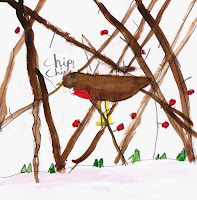It's Brownies Thinking Day soon. That means for us that Megan has brought home a tube of Smarties that she earns for doing jobs. The idea is that she does a job around the house, earns a Smartie and a coin. The coins then replace the Smarties in the tube and she takes the tube back to Brownies. (So yes, it's a kind of fund-raising. I’m not sure where the money is going, but I’m sure it’s a good cause.)
It all sounds wonderfully wholesome, but we're treating it with a degree of caution. What we're not doing is saying to Megan "If you do this, then you will earn a Smartie." Instead, we're rewarding her after she has been helpful.
In Drive, Dan Pink talks about the difference between intrinsic and extrinsic motivation. Or the pleasure in doing something for yourself, against doing something for a reward. In the book, Pink describes an experiment where young children (all of whom had showed an equal interest in drawing) were rewarded for drawing pictures. Some were rewarded with a certificate after they had completed the drawing, and others were promised a treat before they started. About a week later, the children who were rewarded afterwards, continued to draw as before. But the other children, those who had been promised a reward, now no longer drew. Their motivation for drawing, it seemed, had changed: if they weren't going to be rewarded for drawing, they weren't going to do it.
We've seen this with Megan.
Right now, as I type this, Megan is finishing off a drawing of a pet shop. But for a year or two, she stopped drawing completely...
A couple of years ago (and before I had read Drive), Megan made some homemade Christmas cards and sold them to us for 50p a piece. We thought this was delightful and made the right sort of noises and Megan then made us a small number of cards that we sent to friends and family.
Shortly after that I read Drive, and as I read the description of the experiment with the kids, I realised with horror that Megan had now almost completely stopped drawing. She used to love drawing, and now she didn’t do it.
We had inadvertently taught her that there was no worth in drawing if she couldn't sell her drawings afterwards.
It's taken us at least a year for Megan to re-learn the delight of drawing for it's own sake.
So we’ve been treating Thinking Day with a bit of care. It's a lovely idea, yes, but we need Megan to contribute to the running of the household (tidying up, helping with the washing up, and so on) without the expectation of a reward. And Thinking Day could undo all our good work.
The BBC's More or Less touches on this here.
It all sounds wonderfully wholesome, but we're treating it with a degree of caution. What we're not doing is saying to Megan "If you do this, then you will earn a Smartie." Instead, we're rewarding her after she has been helpful.
In Drive, Dan Pink talks about the difference between intrinsic and extrinsic motivation. Or the pleasure in doing something for yourself, against doing something for a reward. In the book, Pink describes an experiment where young children (all of whom had showed an equal interest in drawing) were rewarded for drawing pictures. Some were rewarded with a certificate after they had completed the drawing, and others were promised a treat before they started. About a week later, the children who were rewarded afterwards, continued to draw as before. But the other children, those who had been promised a reward, now no longer drew. Their motivation for drawing, it seemed, had changed: if they weren't going to be rewarded for drawing, they weren't going to do it.
We've seen this with Megan.
Right now, as I type this, Megan is finishing off a drawing of a pet shop. But for a year or two, she stopped drawing completely...
Shortly after that I read Drive, and as I read the description of the experiment with the kids, I realised with horror that Megan had now almost completely stopped drawing. She used to love drawing, and now she didn’t do it.
We had inadvertently taught her that there was no worth in drawing if she couldn't sell her drawings afterwards.
It's taken us at least a year for Megan to re-learn the delight of drawing for it's own sake.
So we’ve been treating Thinking Day with a bit of care. It's a lovely idea, yes, but we need Megan to contribute to the running of the household (tidying up, helping with the washing up, and so on) without the expectation of a reward. And Thinking Day could undo all our good work.
The BBC's More or Less touches on this here.


No comments:
Post a Comment